
Exposé Online
What's old
Exposé print issues (1993-2011)
- 1 (October 1993)
- 2 (February 1994)
- 3 (May 1994)
- 4 (August 1994)
- 5 (October 1994)
- 6 (March 1995)
- 7 (July 1995)
- 8 (November 1995)
- 9 (March 1996)
- 10 (August 1996)
- 11 (February 1997)
- 12 (May 1997)
- 13 (October 1997)
- 14 (February 1998)
- 15 (July 1998)
- 16 (January 1999)
- 17 (April 1999)
- 18 (November 1999)
- 19 (May 2000)
- 20 (October 2000)
- 21 (March 2001)
- 22 (July 2001)
- 23 (December 2001)
- 24 (April 2002)
- 25 (September 2002)
- 26 (February 2003)
- 27 (August 2003)
- 28 (December 2003)
- 29 (April 2004)
- 30 (September 2004)
- 31 (March 2005)
- 32 (September 2005)
- 33 (May 2006)
- 34 (March 2007)
- 35 (January 2008)
- 36 (October 2008)
- 37 (July 2009)
- 38 (July 2010)
- 39 (Summer 2011)
Features
"Play now! Stop!" —
The Gary Green Interview
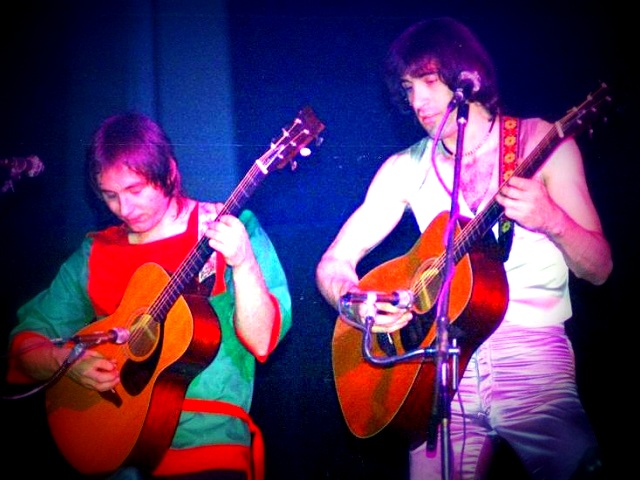
During ten years as a member of Gentle Giant, Gary Green helped temper the band's odd time signatures and medieval themes with old fashioned blues-based rock guitar. His down-to-earth playing helped keep the esoteric elements of the band's music from completely alienating many listeners. And it is exactly this contrast, the visceral with the cerebral, which still endears many fans to the band after all the years since their breakup. This interview took place in November 2003 at the "Columbia GORGG" festival in Portland, Oregon, USA.
by Jeff Melton, Published 2004-04-01
photography by Ueli Frey, Jerry McCarthy
Can you tell us a bit about your early musical influences?
I'd have to start right off with Eric Clapton probably. My Dad used to play an awful lot of jazz at home and that's where me and my brothers got out early musical hearings from so. It would have to be Benny Goodman, Duke Ellington and lots of stuff like that really and Frank Sinatra even way back then. But for me as far as guitar playin' – my father's a guitar player; used to anyway and he used to play in the style of Django Reinhart. But I suppose what I intended to emulate early on was "Walk Don't Run" by the Ventures, as well as the band, the Shadows in Britain. They're kind of like the British Ventures I guess. They had a string of instrumental hits, which I bought and learned. Basically I was on into the blues then with Eric Clapton and Peter Green and all that stuff. That's kind of my earliest thing there. And the Beatles of course – that's everybody's isn't it? I saw the Beatles when I was fourteen. My auntie bought me tickets to their Christmas show in London. I think I was fourteen, thirteen maybe. But I had known who they were and I could anticipate their first album coming out because they had had hits and stuff. It was a big deal when an artist had a single; it was then followed up with an album. That was the way into the market, with singles, back then. So I had heard the first four singles I suppose and then they brought out Please Please Me, the album. It was quite influential, in fact I remember making a Hofner cardboard left-handed bass guitar to play in front of my Auntie at some point! A little bit strange, but that's what they were really.
So what was your first guitar?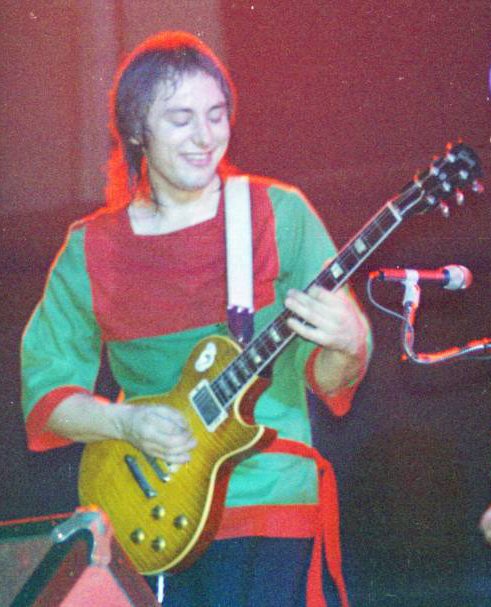
Well, I guess I would pick up the guitar my brother was leaving around the house, you know? It was a Spanish guitar, and it had three strings. My brother showed me how to play some chords with just three strings – the top three – E, B and G. My actual first guitar was a white one that I painted black. It looked really cool in the shop, it had one cutaway and it had an action. After I started to learn to play on that thing, I painted it black and then I carved "Downward Prohibition" trying to emulate Donovan with the labels on it and stuff. It's kind of strange admitting that now, but I guess it's true so what the hell.
There were a lot of other people who did the same thing at the time, right?
Yes, it was that left kind of anti-establishment thing that was going around then. But which I probably kept with me (laughs).
What kind of band you were playing in right before you auditioned for Gentle Giant?
I actually was not in a band immediately prior to that. I had been in a semi-pro band, which was my first that we got paid for, called Fishhook. I don't know if you saw the picture books I had at GORGG [Global On Reflection Giant Gathering, a Gentle Giant fan convention - ed.], but there was a publicity picture of our Fishhook band. I think I was all of seventeen; I suppose we actually did get paid. We had some actual bookings. Before that I had a school band, the Outrcry I think it was. We played Kinks tunes and a couple of Beatles tunes and "Long Tall Sally." I actually had a blues band with my brother Mike who has since passed on. He was the drummer and the band had a guitar player called John Wilkins who was on the other guitar. Apparently he's a friend of John Mayall's; he grew up with him in Manchester. We had a residency in a pub in North London. And one night these guys, Fishhook came along and kind of stole me into their band. So I played with them for a while but I mean I don't know how long it was. These things seemed like they lasted forever now, but obviously it couldn't have been any more than a year I suppose I spent with Fishhook. And then that band broke up, and I then moved back home. My parents had moved from North London out into Essex, which is only about thirty miles, but back then in the mid to late 60s it seemed like the end of the Earth. And it kind of turned my world upside down a little bit. I had a job in a local department store and it was really wearing me down and I decided I was going to do this thing – be a professional musician. So I started doing the rounds of auditions. I went to a whole bunch, and mostly they were just awful experiences. There were people who couldn't play, and I probably couldn't either. But I probably played okay, so I got the job with Giant, but it seemed to me that they (auditions) were just awful. One day there was an ad in Melody Maker (the music paper) there and it said, 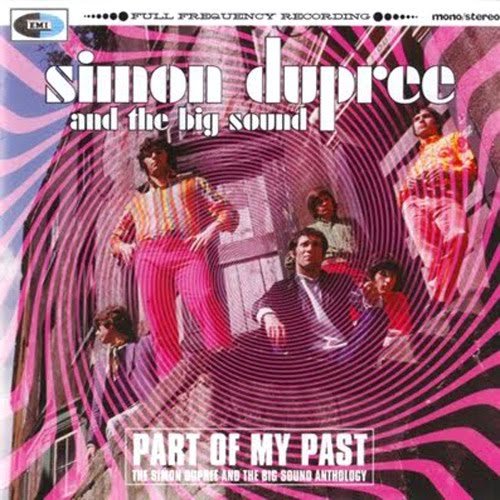 "Name musicians need a guitar player." There was a phone number and I called and arranged an audition. It was in a pub in North London near where my brother Jeff the guitar player lived. We walked in and it was Gentle Giant although they had on the bass drum "Simon Dupree and the Big Sound." They were a pop band and I really wasn't into pop. I was very much into the blues, and I was in that encampment in the music scene. At least to me at that age in London at the time, you were either in the blues soul camp or you were in the pop camp and never the twain would meet. You hated each other just on sight. That was always in the back of my mind when I saw the bass drum logo. I thought, "Oh my god, what am I doing?" But then when they started talking and they started asking me to play things, I realized these are actually very good musicians. They're a lot better than me. And it was a good experience; I decided I really wanted to take the plunge and move along a bit from just doing blues playing, which I loved and still love. But it sounded a little restrictive; I had a musical leg that I wanted to stretch at that point.
"Name musicians need a guitar player." There was a phone number and I called and arranged an audition. It was in a pub in North London near where my brother Jeff the guitar player lived. We walked in and it was Gentle Giant although they had on the bass drum "Simon Dupree and the Big Sound." They were a pop band and I really wasn't into pop. I was very much into the blues, and I was in that encampment in the music scene. At least to me at that age in London at the time, you were either in the blues soul camp or you were in the pop camp and never the twain would meet. You hated each other just on sight. That was always in the back of my mind when I saw the bass drum logo. I thought, "Oh my god, what am I doing?" But then when they started talking and they started asking me to play things, I realized these are actually very good musicians. They're a lot better than me. And it was a good experience; I decided I really wanted to take the plunge and move along a bit from just doing blues playing, which I loved and still love. But it sounded a little restrictive; I had a musical leg that I wanted to stretch at that point.
Well there is no doubt about it: the blues influence you brought into the band is one of the most consistent things.
Yeah it is, isn't it? I often wonder if it's a good thing in retrospect for Giant. I've wondered I guess in the past, what kind of band would they have had if a – I don't want to say more competent guitarist – probably a more broadly based guitar player? I don't know. It still would have been a good band, but it wouldn't have been the same band.
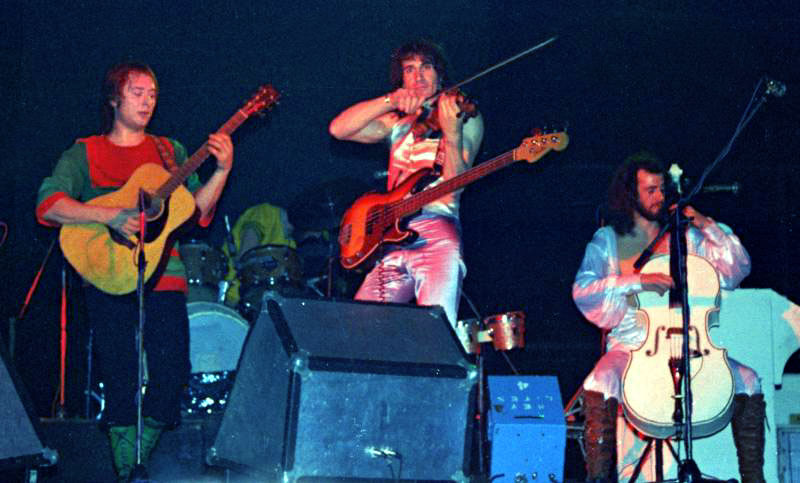 I think people look for a foundation in something that they know. And blues guitar is a good avenue into the band.
I think people look for a foundation in something that they know. And blues guitar is a good avenue into the band.
It sure is. And kind of like John's drumming. It gave it a kind of root that was not inaccessible which perhaps it could have otherwise been. I mean we're often called high-falutin' and too technical and all this. And I like to say that I gave it a common base people could anchor to.
Honestly when the band really wanted to rock, there is no doubt about it, you guys could do it. You had a lot of good guitar solos. Many people were thinking as they were listening, "Well there is all this weird stuff going on, but that guitar player really rocked."
Yeah, well I have heard comments to the other extreme too (laughs)! You can't please everybody, and you shouldn't try in the end. You gotta do it 'cause you love doing it, and you just let those chips fall where they may. You can't worry about what everybody else thinks; you must do what you believe in and that's what you do. And if you can't take a joke…
What can you tell me about the band's first managers?
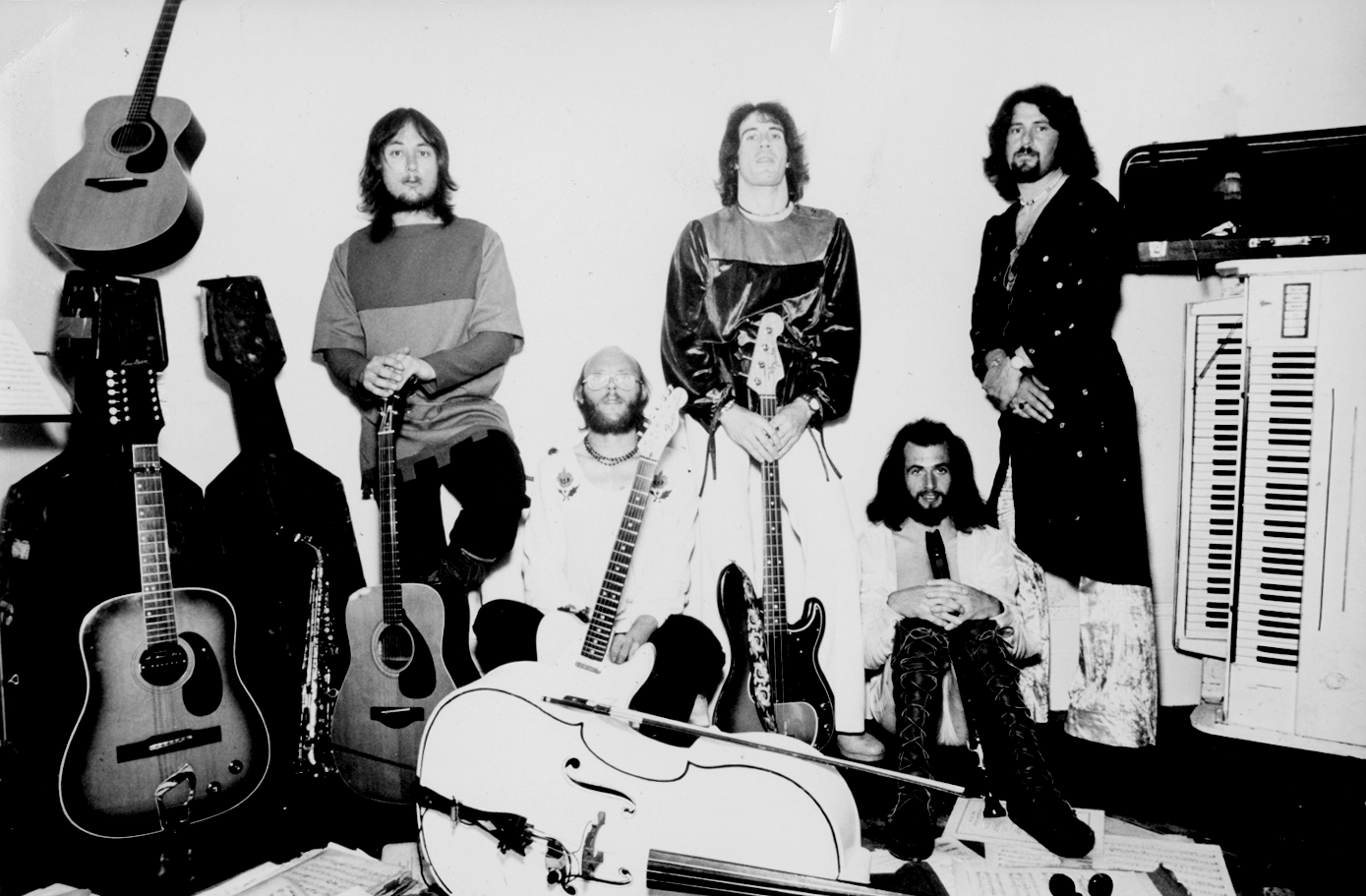 Our first management was Gerry Bron who managed both Uriah Heep and also Colosseum. We played with both of those bands; in fact we did a tour with Colosseum in Germany, which was really great. We really enjoyed ourselves with them. That exposed us to a good audience. They were a good band; I liked Jon Hiseman since Graham Bond days. And my brother Mike was a drummer and he was always going on about Jon Hiseman. So we played a few gigs with Uriah Heep; they weren't quite our cup of tea, but they were good guys. And the common interest was that we had the same management and we were always bumping into them in the offices always which was quite funny. We were always coming in different points in our career. Who was having hits and who was doing whatever. So that was pretty good. But then my memory is a little bit vague on how we got... I think we thought Gerry Bron was not able to... Oh, I think actually he approached us, saying not that we were getting too musically adventurous for him to be able to promote us. I think he thought, "You were ready for something else. So off you go and fly from the nest as it were." He had managed Simon Dupree and the Big Sound and he was totally instrumental for allowing Giant to get off the ground ‘cause he underwrote our six months rehearsal we did when we first formed the band. And without that financial support there probably wouldn't be a Gentle Giant today. 'Cause we all had a living wage, albeit very small, at the beginning. Well, we were just rehearsing. Everyday we went to a pub in Portsmouth and we played for six hours. We basically did the whole first album that way, rehearsing all the pieces and some of the material that never saw the light of day. And we winnowed out what was going to make it and what was going to work live. And this and that. It also allowed a bonding period for all these guys to get to know each other. 'Cause Kerry I think had only joined the band probably a couple of months before I did. So we were all new characters to each other and it was a great period for us to get to know each other and how each other works before we were entering into the public. So without Gerry Bron this would have kind of been impossible to get off the ground. And so in the end I think he just thought, "Well, you guys are doing great on your own; you need to kind of take wing." I think then we sought other management. I don't know how we got to be with World Wide Artists (WWA) which was our next management. I don't quite remember how that came about. But I think Derek obviously had a lot to do with that and he knew Sabbath's manager. There was Pat Meehan Senior and there was Pat Meehan Junior and the had offices in Mayfair and that was really quite something. No they didn't at that time – it was at Leicester Square, I remember. But they probably promised us the Earth and said, "This sounds good!" Plus they were able to finally get us onto an American tour with Black Sabbath which at the time we really thought... we weren't doing real good in Britain; we were getting fairly well received, but it wasn't happening like I expected it would happen. We thought there were richer pastures out there. I mean America is like the Holy Grail of gig players as a band back then. Everyone was going to go do an American tour and we wanted a shot. It seemed like we were going to go do it with World Wide Artists, and indeed that did happen in the end but it still took a little while before it came about.
Our first management was Gerry Bron who managed both Uriah Heep and also Colosseum. We played with both of those bands; in fact we did a tour with Colosseum in Germany, which was really great. We really enjoyed ourselves with them. That exposed us to a good audience. They were a good band; I liked Jon Hiseman since Graham Bond days. And my brother Mike was a drummer and he was always going on about Jon Hiseman. So we played a few gigs with Uriah Heep; they weren't quite our cup of tea, but they were good guys. And the common interest was that we had the same management and we were always bumping into them in the offices always which was quite funny. We were always coming in different points in our career. Who was having hits and who was doing whatever. So that was pretty good. But then my memory is a little bit vague on how we got... I think we thought Gerry Bron was not able to... Oh, I think actually he approached us, saying not that we were getting too musically adventurous for him to be able to promote us. I think he thought, "You were ready for something else. So off you go and fly from the nest as it were." He had managed Simon Dupree and the Big Sound and he was totally instrumental for allowing Giant to get off the ground ‘cause he underwrote our six months rehearsal we did when we first formed the band. And without that financial support there probably wouldn't be a Gentle Giant today. 'Cause we all had a living wage, albeit very small, at the beginning. Well, we were just rehearsing. Everyday we went to a pub in Portsmouth and we played for six hours. We basically did the whole first album that way, rehearsing all the pieces and some of the material that never saw the light of day. And we winnowed out what was going to make it and what was going to work live. And this and that. It also allowed a bonding period for all these guys to get to know each other. 'Cause Kerry I think had only joined the band probably a couple of months before I did. So we were all new characters to each other and it was a great period for us to get to know each other and how each other works before we were entering into the public. So without Gerry Bron this would have kind of been impossible to get off the ground. And so in the end I think he just thought, "Well, you guys are doing great on your own; you need to kind of take wing." I think then we sought other management. I don't know how we got to be with World Wide Artists (WWA) which was our next management. I don't quite remember how that came about. But I think Derek obviously had a lot to do with that and he knew Sabbath's manager. There was Pat Meehan Senior and there was Pat Meehan Junior and the had offices in Mayfair and that was really quite something. No they didn't at that time – it was at Leicester Square, I remember. But they probably promised us the Earth and said, "This sounds good!" Plus they were able to finally get us onto an American tour with Black Sabbath which at the time we really thought... we weren't doing real good in Britain; we were getting fairly well received, but it wasn't happening like I expected it would happen. We thought there were richer pastures out there. I mean America is like the Holy Grail of gig players as a band back then. Everyone was going to go do an American tour and we wanted a shot. It seemed like we were going to go do it with World Wide Artists, and indeed that did happen in the end but it still took a little while before it came about.
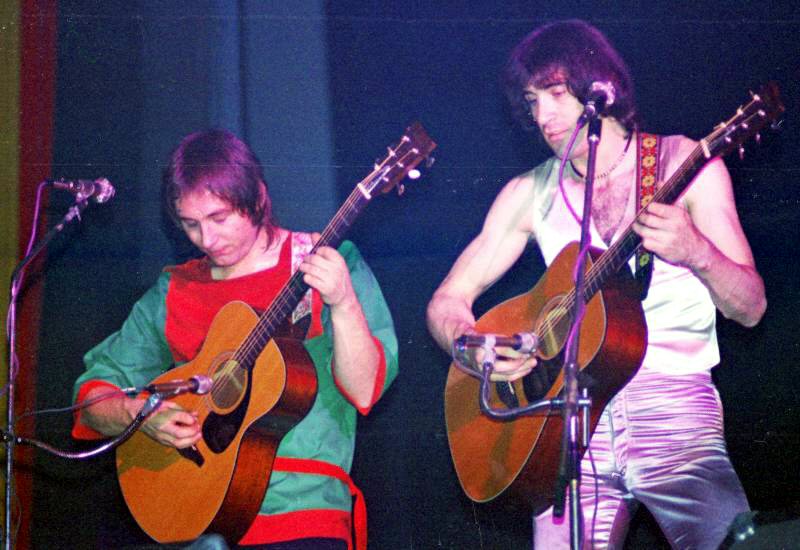 There doesn't seem to be much live material from Acquiring the Taste except for "Plain Truth"...
There doesn't seem to be much live material from Acquiring the Taste except for "Plain Truth"...
I don't think that was intentional. Phil stated it in those liner notes, that our goal was to explore... "Our five year mission is to explore the musical universe!" Something like that, and it was kind of experimental in that regard. We kind of made the music even without thinking about whether that we were going to play it live. I don't recall that it was ever a consideration. I don't know why now. But obviously most of it doesn't lend itself to live... well but it might now, so I suppose that's another thing. You look back on it and you think, "That would be great in a concert setting." In fact we did play "Pantagruel's Nativity" once or twice live. But it was a hard tune to play with the equipment that we had back then. A lot of that stuff would have been easier to achieve live now with musical equipment and a lot of electronic equipment. But I always had a soft spot for that album. I loved its adventurousness and mood; it's got a kind of a dark mood to it.
There are some intense moments particularly "The House, the Street, the Room." The middle section is just brutal.
Yeah, it is, isn't it? Although it is a very dark album, we had a huge amount of fun making it because everything was totally new to us in the studio. We hadn't really recorded before except for the first album, and that kind of happened in a blur. We got to Advision studios where the tapes were recorded with Tony Visconti. And Kerry's musical genius was starting to bloom there and Ray's in conjunction with Kerry's; it just opened up a whole world for us. Suddenly all these things were there at our fingertips. We were playing around with tape speeds, backward echoes… and Moog synthesizers had just come on. It was really fun to do that. It was just absolutely wonderful.
I was very happy with things like my solo with "The House, the Street, the Room". Some of the time I wasn't very happy with my solos on album – I didn't get it right, it was a bit too bluesy perhaps – but that piece hit the right note totally. It was a weird solo to do really because it was over a whole tone scale and I'd never done that before, and I'd never even thought about it. I had this big solo, but I didn't know when I was going to practice it. But I said, "I'm going to do this. That's going to work." I was pretty happy with that because it was a good marriage between my previous bluesman experience and coming into Gentle Giant.
Now that you mention it the coda [of "The House, the Street, the Room"] with those weird instruments and little parts going on – it was like a two bar phrase, then a three bar phrase and they're repeated five or six times each with a different instrument playing each part. There was a very funny part in that because Martin [Smith], who played drums on that album... We all sat round in the studio; it was a big studio; it was meant for an orchestra. It was meant literally to add vision [audio] to films, which was what the studio was built for. The film would play in the background, and the conductor would conduct the orchestra with the film going on. So it was big and it had a podium in there. And we were situated all around this room. We had Kerry's friend Paul Cosh playing trumpet. We'd all play this one bar phrase and then there would be a Spanish guitar, a violin, a trumpet – whatever was at hand we'd play. There were often instruments left in the studio from other orchestral sessions that were there. So we all played these crazy things, and Martin got up on the podium and started conducting us. "Play now! Stop!" which was such a huge cacophony, which was hilarious! I wish that had made it onto tape. But it was a very funny moment. So even making such a somber serious album like Acquiring the Taste was a light affair, almost. Strange, but true.
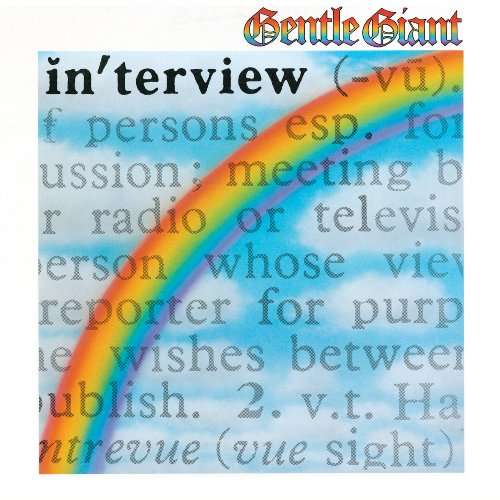 I know a lot of the tracks were Shulman, Shulman, Minnear credited. And Kerry clarified that he and Ray spent a lot of time coming up with the arrangements. Basic songs and melodies first and then basically present a lot of ideas to you guys to help flesh out right? Some of the guitar parts you had, like some of the weird ones on "Another Show" that was just some wild stuff you got going there. Did you compose some of those parts and insert those in and then not necessarily get songwriting credit?
I know a lot of the tracks were Shulman, Shulman, Minnear credited. And Kerry clarified that he and Ray spent a lot of time coming up with the arrangements. Basic songs and melodies first and then basically present a lot of ideas to you guys to help flesh out right? Some of the guitar parts you had, like some of the weird ones on "Another Show" that was just some wild stuff you got going there. Did you compose some of those parts and insert those in and then not necessarily get songwriting credit?
I'm not sure, I mean my recollection is that the parts were largely already there and kind of given to me to interpret, if you like. I didn't change them a lot. Funny that you should pick that tune particularly because that's actually one that Derek wrote on a really bad acoustic guitar through a Revox machine. And he had this little 5/4 phrase or something. Derek would come up with weird things like that now and again and then he'd throw them to Ray and he'd say, "There, what'd you think?" Ray would then hammer them into some shape. Then we'd play them through and adjust this and that. So I don't know that I can actually be credited with any written parts at that point. The blues things I could play were always for sure in Kerry's and Ray's mind. I know they would come up with parts that either they couldn't play themselves or some weird something? And offer it up and say, "What do you think; could you play this?" Yeah I could do it like this or like that. And you'd arrive at something that would fit the tune. But always we were subservient to the tune. The tune is what's gotta work, regardless of a person's ego getting in there. That was always – for me at least – the bottom line of what a part should do. It's gotta work within the tune. It's not good having this show-off piece that doesn't have anything else to do with art – it's totally pointless. But I think you'll find we all felt like that. I think that's part of the glue we had.
Yeah, that makes sense because your catalogue holds together really well. For ten years of work I think it's pretty solid.
I think it is too, yeah. It kind of gets a bit strange at the end.
Do you remember the first time you played a recorder with the group? I'm trying to imagine the first time Kerry or someone said, "We're going to do this recorder bit now."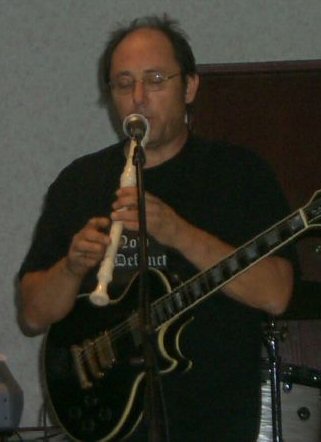
Well, let's see. There is recorder piece on Acquiring the Taste, as I remember, and I can't remember what it is off hand. But as it happened, Tony Visconti is a very good recorder player, a sight reading recorder player. And so it came about, I don't know if Kerry caught wind of this and then wrote a piece [part of "Wreck" – ed.]. I think he had written a piece for four wind instruments of undetermined origin. And then maybe Tony Visconti said, "Well, I play recorder, and I can play this part for you." So that was the origin of it. And I think then we realized that the sound of recorders really fit Kerry's Early Music preoccupation, it really fit in. I think then we decided we could learn to play a few parts. I wasn't a recorder player before then and I'm not now even. But I learned to play those parts. And we often tried to do the best we could with and got a little bit skillful with it, not terribly. I'm not talking master musicians here. You're talking about learning the part that fit the tune, and we learned that per se.
Do you feel there are any particular studio albums where you really nailed it?
Probably Octopus. As far as complete things like an entire album, Octopus was good for me, um. Not just guitar, but I play a lot of percussion too. In fact, my tambourine playing got a good write up in Stereo Review in Britain. They lauded it as a well-recorded album, looking at more of the audiophile things. For the time, it was a nicely, beautifully recorded album. He cited my tambourine playing, but it was kind of a musical comment. It wasn't just shaking a tambourine; it was playing a percussion part, which is after all it was. I've always played drums as well. With most guitar players I've talked to, you find a frustrated drummers. Well, I'm a drummer who is a frustrated guitarist, kind of.
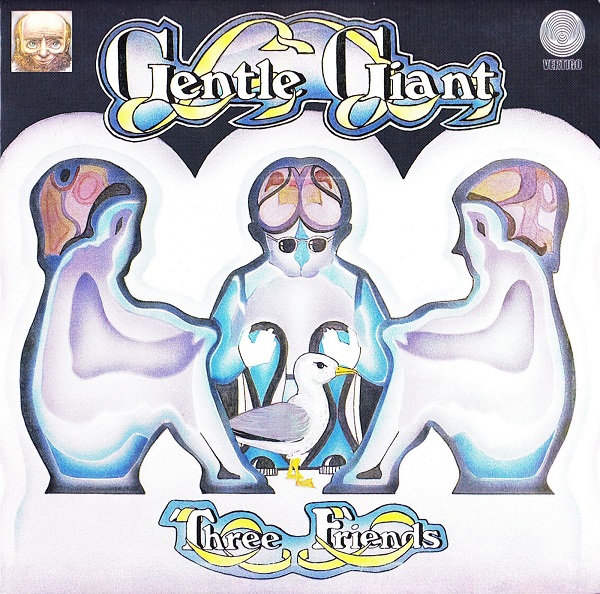 What was the thing with the album covers? Album covers got messed when LPs were released in the US. Three Friends I can kind of understand, but Octopus I completely don't. Can you explain?
What was the thing with the album covers? Album covers got messed when LPs were released in the US. Three Friends I can kind of understand, but Octopus I completely don't. Can you explain?
Yeah, I couldn't get that one either, since I loved the Roger Dean cover that we had in Britain. And I don't' really know why. Well, I tell you what, you have to blame us for that one, for the first release here in the US, which was Three Friends. You gotta blame us for that one, because we didn't get our first album released here and our first release in America was going to be... None of us was very happy with it [the Three Friends cover] because – I don't want to go too much into that. The fact is that the first album cover was so indicative, I don't know, and had been the band's logo forever, of course: the Giant head. And it was a brilliant album cover. When we saw our first album release over in America, we thought it should have that album cover on it. Of course we were totally forgetting about the fact that we would completely confuse everybody when subsequently the first and second album got released over here. But the Three Friends cover – it was almost second rate. The artist, Rick Breach had submitted a couple of ideas, which were very childishly executed unfortunately. But it still somehow conveyed the three friends thing. We couldn't come up with a better idea on our own. But largely the covers were of our own making, compositions if you like, except for Three Friends I think. And the first one of course, since that came out of left field – it got assigned to some guy and we said, "Well okay we'll have that!" [The cover for] Acquiring the Taste was our idea, but it wasn't very well executed. But we really did like the idea. In those days there was the gatefold album, and it looked like it was doing something nasty to the rear end of somebody. "Oh my god, it's a peach!" It's not what you thought after all.
The sexual innuendo worked in your favor after all.
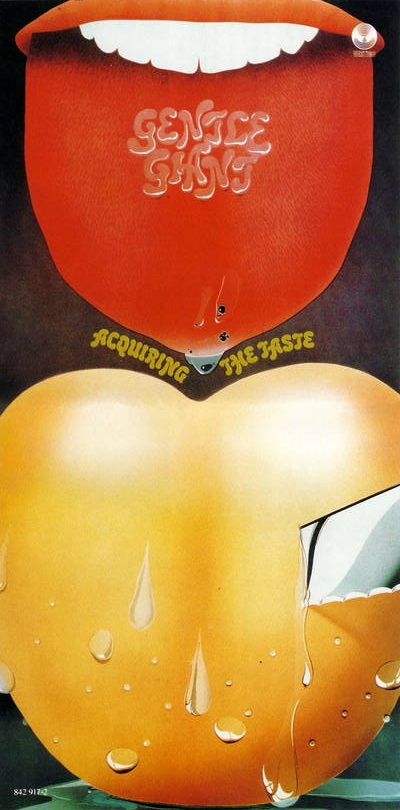
We had to write a wry comment on the side.
The band had difficulty staying at labels. And that went with the territory right? Capitol seemed to have the best distribution.
Yeah, we did seem to jump, although the longest we seemed to be with one was Columbia over here. I think at Columbia we had the guy who went on to form Arista Records: Clive Davis. Clive Davis kind of took us under his wing a little bit at Columbia, and we were very happy with that. We liked him and then he was fired or moved on. I don't understand how he came to leave Columbia. But we went out the door with him. Not as a result of any choice that we made; I think they were like cleaning house. And that's kind of what happened there, for Columbia at least. Capitol was good to us over here as well, like you say. It was hard to tell for me, anyway. I regret now not being more business savvy and taking more interest in what was happening with distribution and units and all that. I really wasn't interested in it at that time. My prime focus – and for most of us – was make the music and get the music out. Of course we could have gone the extra step and thought, "Well, who's best able to distribute the music for us to our best benefit?" Of course, we didn't make that step. Derek was the one who was most on top of that stuff.
Capitol had the sense to put you with some like-minded groups, and you could open for a band which was not a complete mismatch. Though John Weathers has said you played for all different sorts of people from Mahavishnu to J. Geils.
Yeah. Foghat, Black Oak Arkansas, Black Sabbath... That was all very strange. I mean, thinking back, there probably weren't an awful lot of bands we could have played with that would have been a terribly compatible bill. I mean fortune hit us great when we started touring with Tull, and they took a kind of shine to us. That was a perfect bill. We didn't get along very well with Yes, I must say. They were kind of dicks when it came to stage space and all that stuff. Those weren't particularly enjoyable gigs even though they're a good band and it was a good bill. We suffered; they wanted to make sure were kept in our place kind of thing. We hated that and Tull were open about, "We don't care. We're a big band. You do what you like. If you can blow us off, well good luck to ya!"
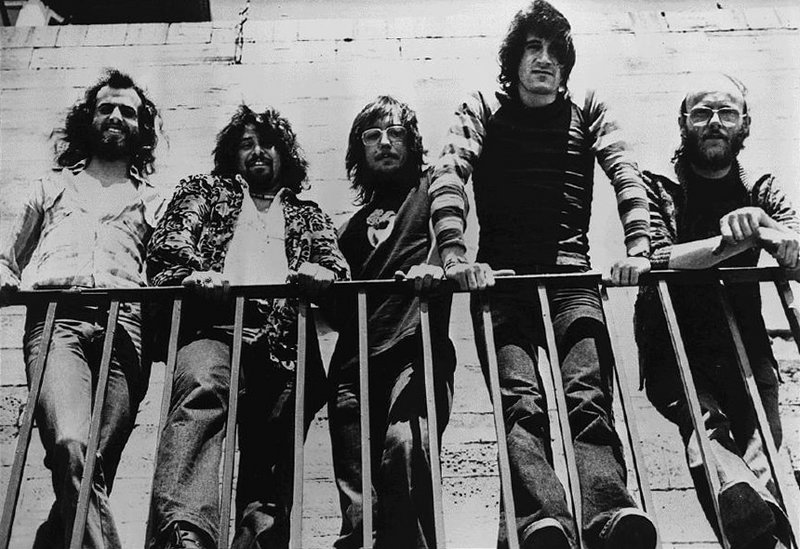
Maybe a few bands were intimidated by you?
Well, it could have been. I don't know that for a fact, but that's the scuttlebutt amongst the group. You seem to suffer, and you then you have a rallying point, "The headliner's a bastard!" It seems ludicrous that they would have thought that. We wouldn't have thought about anybody playing with us. It was an alien mindset that we didn't understand, I think. Someone wrote to one of the newsgroups the other day saying when Yes appeared on stage, it was like, "The gods appearing from the heavens, deigning to play in front of the people." That's the impression we got from them too. Then when Gentle Giant appeared, it was like this "aw shucks" band.
It seems as if touring America, and gravitating away from Europe, was kind of like your bread and butter from the mid-seventies on?
Away from Britain at least. We did tour quite extensively in Europe. Our tour schedule seemed to be half Europe and half America throughout most of the year. We did do British tours but it never seemed that we could go down very well at home. I don't know. I mean British audiences are typically reserved. It was very different after we had been to French Canada and Chicago and Italy where people had gone nuts. When we played in Italy we used to tune up on stage in the days before tuners, well we couldn't afford one so we didn't have a backstage tuner. So we'd tune up on stage and make sure we were in tune with the keyboards. We used to go on stage and I'd ask Kerry for a note and he'd play the note to me. And the audience would turn around to each other and go "Shhhhh". And start shushing each other. There were fifteen thousand people and you could hear a pin drop; it was extraordinary! It was very different to go from that kind of thing to Britain where they just didn't care at all, it seemed like. We had some reasonable gigs there in London, but there were some venues that were real dogs we played there. It was just a shame; it's your home country and you want to do well, and it doesn't happen. Although having said that, there were some good gigs. Our hometown was Portsmouth (which was Derek, Ray and Phil's hometown we all moved to when we joined the band). We got good reception there. The "local boy makes good" kind of thing. Different kind of crowd in Britain it was, and probably still is for all I know. Touring seemed to be split between Germany and Italy, our main places there. And in the States, French Canada was just terrific for us. I don't know why French Canada of all places; it just took off like a rocket there. And we were able to play Montreal Stadium and get fifteen to eighteen thousand people in there, which was kind of boggling.
The American audiences generally were not going to get you. The Europeans did. Even when you guys tried to change your style and go a bit more straightforward rock, it seemed to work a little. The last two albums I still like a lot, but they lack a lot of the complexity.
Yeah they really do. They were tailored for a more American consumption. Not just mid-America, but mid-Europe too. We lost some of that experimental edge I think. But I think that kind of happens with a lot of bands. They always start off with great intentions. I think we always had great intentions. They peak at the beginning then they lose something.
You don't think you guys did the big sellout? 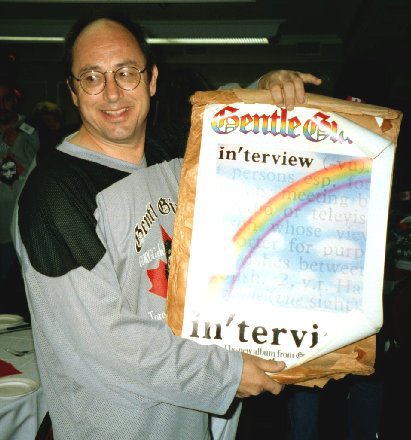
No, I don't think. Happily we quit before that happened – or not happily really. We could have had a different mindset, I think. I mean my own personal opinion is that the band broke up because Derek really wanted a hit album, and I think Ray did too, and they were fed up. They had been musicians longer than I had, and they had tasted it pretty good when they were with Simon Dupree, at least in Britain. And they were looking for some of that in Giant too. My feeling is that we could have continued on as PFM did, or Yes, and still continue. If we had adhered to the statement we started out with, we could still be playing that, and still be earning a reasonable living. That's all water under the bridge and that's fine now. It seemed a bit silly to cut off your creativity for that kind of thing.
So you weren't happy about the band ending, right?
No, I wasn't, no. I pushed for it to continue. In fact the band nearly broke up when Phil left the band.
I've wondered about that.
Yeah. As I remember it, when Phil announced it at the end of an Italian tour, he said he would leave the band. He couldn't continue on. There was too much stress being on the road and the family. Plus the brothers were having a bit of a difficult time. They're brothers and they argued like hell, sometimes to the point where you thought they were going to hit each other. But I guess it was brotherly love (laughs). But when Phil said he was going to leave, we were all like stumped, "Oh! What are we going to do? All right we'll buy a Moog synthesizer!" That's kind of trite; I don't mean it quite like that. We had to do something. John and I really pushed for the band to continue at that point because it looked like we were going to fold. And that seemed just ludicrous – I mean we had Kerry at full strength and Ray writing great. We were really strong live and we were about to get stronger. I think we became a stronger band after Phil left. And that's nothing against Phil. We had just been just hitting our stride as players. I understood the reasons why the band broke up though. We had a meeting in New York when we started the tour over here. We met in New York to get together and see it as a launch off place. Kind of had a talk about what we were going to do. At that meeting Kerry and Derek said this was going to be the last tour and they didn't want to be on the road anymore. And you understand it; they had families. Kerry had just had a baby and Derek was just getting married. But having said that, I was married and so was John. You can change things like that; there are ways to work around that. You don't have to tour. I don't think we really toured an awful lot as Giant. I think we could have worked a lot harder at touring. We toured perhaps five or six months of the year. The rest of the year we didn't tour, which seemed a bit silly if you really want to make it or break the market. So let's go ahead and do it and capitalize on this rush we got. So it all seemed a little odd to me. It was sad.
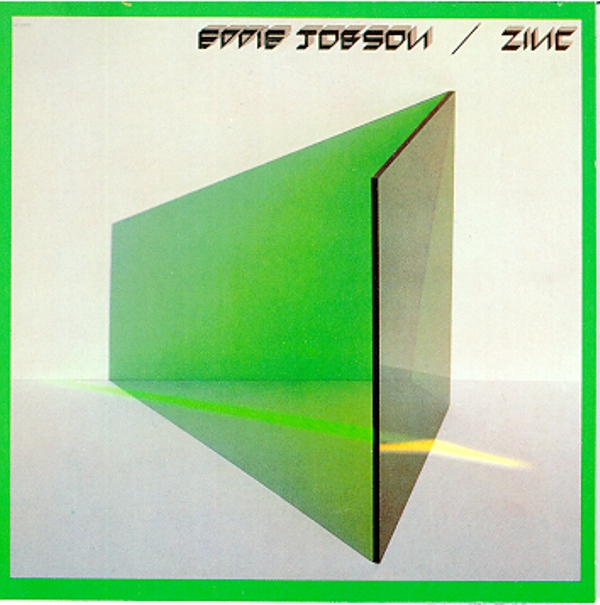 So how did you later hook up with Eddie Jobson? This is a few years later, right?
So how did you later hook up with Eddie Jobson? This is a few years later, right?
Well, that was down to Derek, actually. We had broken and subsequent to the break-up, Ray and I were going to continue on with this band called Shout. The early plan was we were both in it and we were going to do it over here. I had sold my house, and my furniture was half way down the St. Lawrence Seaway when Ray decided he wanted to stay in London. So it was kind of difficult straddling the Atlantic, especially for the time – there was not an Internet or e-mail. Phone calls were hugely expensive. It got very complicated trying to continue that. It just dissolved apart. I'm not sure both of us had our hearts in it; we still wanted to play post-Giant. After Giant broke up we still really wanted to play and we were trying to find a way to do it, but it just didn't pan out. It was just no one's fault, it was just the natural order of things. So anyway, I'd moved over here, wondering what I was going to do and then out of the blue Derek calls me – he lived in New York – and said that he'd run into Eddie Jobson, who was trying to form a band and was recording an album. And I should give him a call. So I called him up and we had a really long good chat on the phone about an hour or two. Subsequently he invited me out to Greenwich, Connecticut, I think it was. And he explained his overall plan that he was putting this "Green" band together, a band called Zinc. And he was kind of auditioning guitarists at the same time as recording them. Seeing how they worked out on the recording and then see if he wanted them to be part of the band. We got on very well and I recorded two to three tracks maybe. It turns out one of the guys on the Gentle Giant newsgroup list was Rich Hilton, who was the engineer on that session. And he remembered because I flew out from Chicago to Greenwich and I took two guitars. One of which I carried with me, and the other one I didn't want to check on the plane, and it being a Fender guitar, I just unbolted the neck and put it in my suitcase. Then when I got to the other end. I didn't have a case for it. I put it all back together at the other end and I walked into the session with one guitar case and one guitar over my shoulder with no case. Rich was flabbergasted at that, "I couldn't believe you were jut walking in with a guitar slung over your shoulder!" That proved to be an interesting session. He's a real talented musician (Jobson). But that album just sank. He mortgaged his house and his parents mortgaged their house to pay for what it took to make it, and nothing happened.
He's been doing electronic music and advertising jingles for years now.
In fact, I was watching a TV show, I can't remember what it was. The show was hosted by Robert Stack – some kind of detective show. And there was music on that – I don't know for a fact, but I swear it was Eddie Jobson because it sounded just like a keyboard he had on that album. I heard later that he was doing that and I wondered later if that was he.
Are there any other sessions you have done?
That is the about the extent of my professional thing. Although I can say I've played in local bands. It's only been in the last eight years of not doing it. Up until the past eight years, I was still a professional musician working in just local bands around here. Trying to pull together the best of the best of the small town that I live in and a few local outlying towns. We played cover material and we did raise musical standards but it... I don't want to say it went over people's heads, because that's too pompous. It's not what people want to hear basically. In a smaller town, all they want to hear is the jukebox. And they hear tunes that they know. They don't want to hear things that may be a little bit musically adventurous. And here we were thrashing out Midnight Oil and Richard Thompson and an Oingo Boingo album. "Who the hell are they?" they're wondering. We played with a whole bunch of bands who caught wind of who I was and stuff, and they were all, "Wow, I can't believe you were in Gentle Giant." That's also been fun. I played in a kind of power pop trio with a drummer from Chicago Brad Stakely but he was known as Brad Elvis I think. And we had a band called the Elvis Brothers. So it was a power pop trio and he was drummer in the style of Keith Moon or Gene Krupa. It was very very simple music. It was enjoyable playing, but I don't listen to it much now. It was good fun, having never done that power chord (thing), and we all had black boots and ties. So there was a few of those I did and it was fun.
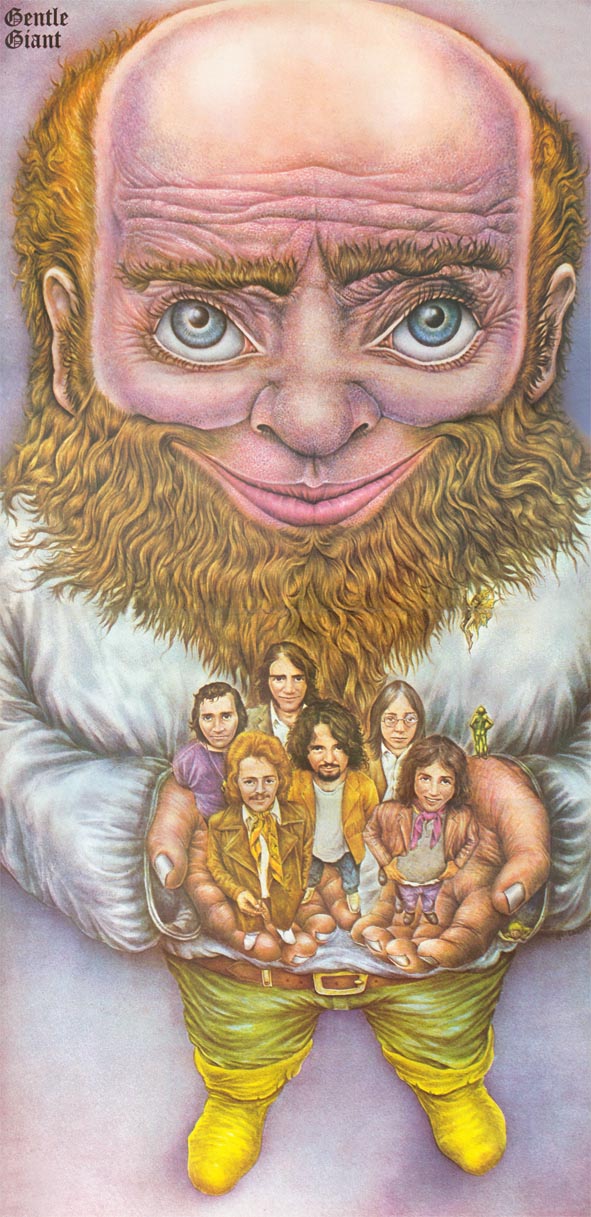 So how would classify yourself now?
So how would classify yourself now?
I'm a workingman! Having to meet the heating bill and all the rest. I really haven't played much in the past three or four years, except with the advent of these GORGG things, my interest has perked right up again. And at this current time I am really anxious to play. Now I kind of don't know how to break into it where I live. It's only a town of seven thousand and it's nowhere near the music industry or musicians. I'd like to be living near Kerry so I could be a flea in his ear all the time, and he in mine. That clearly isn't the case right now, but I miss that and I'm searching for a way to try and get back into music. I've got to practice an awful lot since I'm not anywhere near I should be. But it was funny after the layoff has given me kind of new ideas about playing. And I have to approach it differently. Also I had carpel tunnel surgery. Yeah, I was playing with these bands and I couldn't feel anything I was doing in my left hand. I would be standing there staring at my hands. All my attention was focused on, "I can't feel my hands. I don't know what I'm doing." I wasn't thinking about the playing at all, and that was a complete bummer. I found this really good hand surgeon locally who just happens to be this guy who has pioneered this endioscopic surgery technique. It goes into the palm of the hand and comes out underneath. It undercuts the ligament rather than cut you wide open with a big gash up your wrist. And it's been totally successful. That's been about eight years ago I guess and it's been absolutely trouble free since then, except I haven't played. I'll have to knuckle down and play if I am to be a contender again, like they say.
I'm glad you're considering that, since the plan to commission Kerry to write some new music is very intriguing.
We tried never to over-rehearse a tune. I guess there are two ways to think about that. There is some kind of inspiration that happens in the naiveté of playing a tune when you don't know it very well. And often times you get really good startling results by trying to interpret something they don't really know. We tried to capture that quality. We weren't always after musical note perfection. We were more after capturing that spirit – that was the idea. And so I went into that solo having not rehearsed it; it was happenstance that that feedback happened. I mean I was playing around in the studio and I was getting the sound and I realized I could get this feedback in a certain way, "Okay well, I think I can kind of hit this." Like the intro to it was great. It was perfect – I couldn't have asked for it to be better. A lot of times you have to just run with the serendipity of the moment. And that's how that thing turned out for sure.
Filed under: Interviews, Issue 29
Related artist(s): Gentle Giant
More info
http://www.blazemonger.com/GG/
http://www.drjazz.ch
What's new
These are the most recent changes made to artists, releases, and articles.
- Review: Balloons for the Dog - Wicked Forms of Old Snow
Published 2026-02-13 - Release: Evergrey - Architects of a New Weave
Updated 2026-02-12 19:15:23 - Release: Richard Barbieri - Hauntings
Updated 2026-02-12 19:13:57 - Release: Major Parkinson - Valesa II: Viva the Apocalypse!
Updated 2026-02-12 19:11:44 - Review: Michael Brückner - A Sequence of Colours
Published 2026-02-12 - Release: Tenk Van Dool / Paul Sears - Basal Ardor
Updated 2026-02-11 23:59:30 - Release: Craig Padilla & Marvin Allen - Unfolding Skies
Updated 2026-02-11 23:53:32 - Review: Michael Moorcock & the Deep Fix - The New Worlds Fair (50th Anniversary Edition)
Published 2026-02-11 - Review: Denman Maroney Quintet - Umwelt
Published 2026-02-10 - Listen and discover: Take flight with Steve Roach
Published 2026-02-10 - Review: Ubiks - Ciudad Sumergida
Published 2026-02-09 - Release: Fabio Anile - Minutiae
Updated 2026-02-08 00:46:44 - Artist: Fabio Anile
Updated 2026-02-08 00:42:58 - Review: Schizo Fun Addict - Pasteline Dream
Published 2026-02-08 - Release: Tom Salvatori - Lullaby for Jude
Updated 2026-02-07 19:52:27 - Release: The Grand Undoing - Songs for the Sleeping
Updated 2026-02-07 19:47:29 - Release: The Adelaidean - Nine Breaths
Updated 2026-02-07 00:47:23 - Review: Drill for Absentee - Strand of a Lake, Vol. 1 and Vol. 2
Published 2026-02-07 - Release: Dewa Budjana & Czech Symphony Orchestra - Praguenayama
Updated 2026-02-06 16:05:43 - Release: Immensity Crumb - Chamber Music for Sleeping Giants
Updated 2026-02-06 16:03:56
